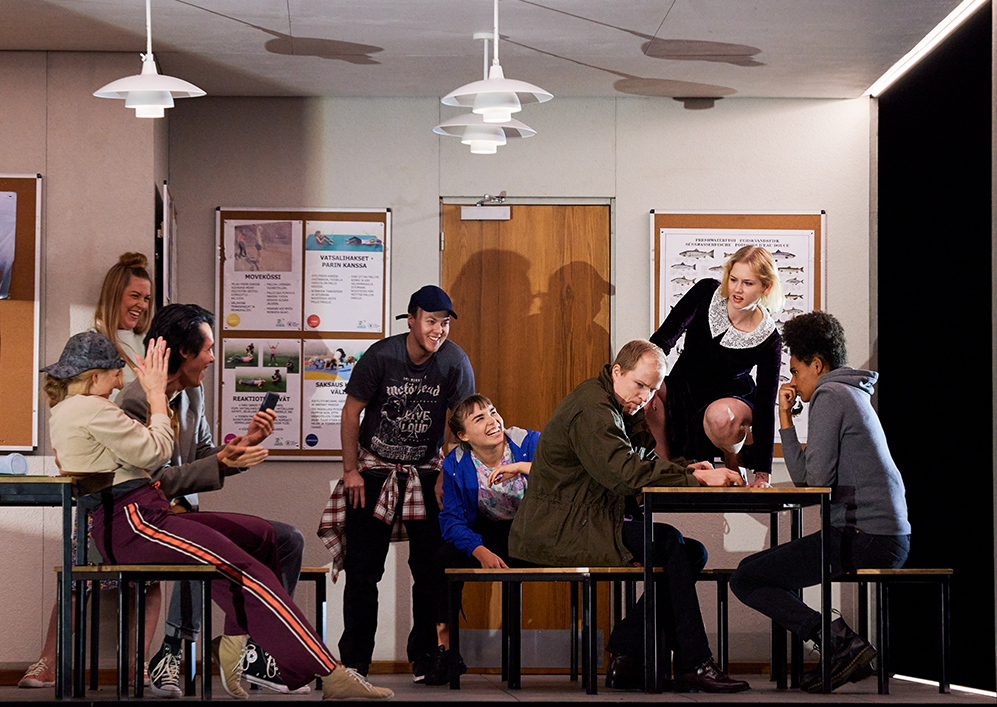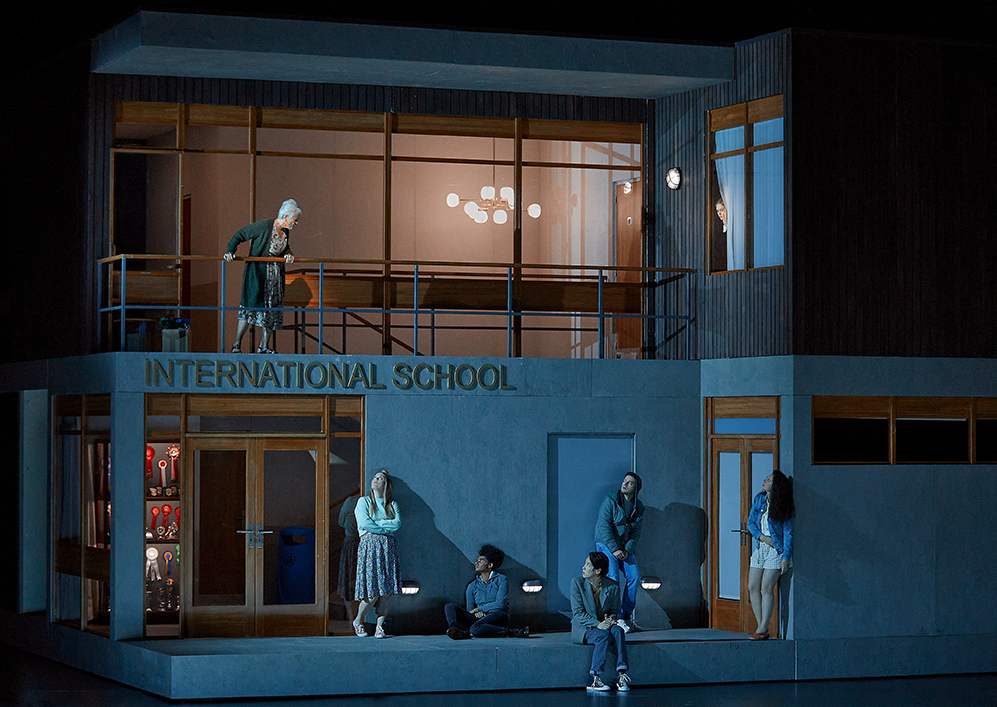
Operatic psychological thriller about the repercussions of a school shooting
Kaija Saariaho’s Innocence revolves around the repercussions of a shooting at an international school. Why did the perpetrator do what he did? Could it have been prevented? And were his family partly to blame? In this thriller in opera form, Saariaho tackles a subject that is highly topical, not just in the US but also in Europe.
Text: Laura Roling
School shootings seem at first sight more of an American phenomenon, if only because the USA has a very different attitude to guns than a country like the Netherlands. The right to keep and bear arms is enshrined in the Second Amendment of the United States Constitution, and it is not difficult to get hold of weapons there.
The debate about gun control flares up regularly, certainly every time there is a major shooting incident. The shooting at Columbine High School in 1999 had a huge impact, partly because of the gripping live reporting on TV. The two perpetrators, high-school students Eric Harris and Dylan Klebold, had spent a year meticulously planning the attack. They made their own explosives and collected a large number of weapons — by getting others to buy them for them. On 20 April 1999, the two students killed thirteen people and wounded over twenty more before committing suicide. It has never been entirely clear why they did what they did, but there has been plenty of speculation about their motivation. For example, the two youths were fans of the gothic rock of Marilyn Manson, they shared a passion for violent films and video games, and they had been the victims of bullying. According to the FBI report, Harris was a psychopath with narcissistic traits who lacked empathy, while Klebold was above all an angry depressive who felt hard done by.
Columbine prompted the film director Michael Moore to make the documentary Bowling for Columbine (2002), in which he explored the social and political context of the shooting. In one memorable scene, Moore and two survivors of the shooting, Mark Taylor and Richard Castaldo, visit the headquarters of the American supermarket chain Kmart where the perpetrators bought the munition for their attack. With Moore at their side, the two victims ask for a refund for the bullets that are still in their bodies. Kmart announces it will be phasing out sales of munitions.
Despite the shockwaves that Columbine sent through society, it did not remain America’s biggest school shooting for long. It was followed by shootings such as those at Virginia Tech (2007, 33 dead including the perpetrator) and Sandy Hook Elementary School (2012, 28 dead including the perpetrator and his mother). The Washington Post recently calculated the number of school shooting incidents in the US since Columbine, and arrived at a tally of 386 to date.

Europe
In Europe, possession of a gun requires a licence, which is subject to strict regulations. As a result, far fewer people own guns in Europe than in the US. But that does not mean that killing sprees with guns are unheard of here. In 2011, Anders Breivik shot and killed 69 people on the Norwegian island of Utoya, where the Norwegian Labour Party’s youth wing had gathered for a summer camp. Technically this was not a school shooting, but there were some parallels: most of the victims were youngsters aged between 16 and 25, and the youth camp setting has similarities to a school setting.
The country that Innocence’s composer Kaija Saariaho comes from, Finland, also has a dark history of school shootings. On 7 November 2007, 18-year-old student Pekka-Eric Auvinen took a semi-automatic rifle to his school in Jokela and shot eight people dead before turning the gun on himself. Less than one year later, on 23 September 2008, 22-year-old Matti Juhani Saari killed ten people at the university of applied sciences in Kauhajoki before committing suicide.
The Netherlands
he first and only time someone in the Netherlands entered a school with the intention of killing multiple people was in 1999 in Veghel, Brabant, when a 17-year-old pupil shot five other students and a teacher. All five were injured but no one died. The perpetrator used a gun owned (illegally) by his father. There have been other, smaller-scale incidents involving guns in schools with only a single intended victim. In 2004, a student of Terra College in The Hague shot dead a vice principal with whom he had been embroiled in a conflict. In 2016, a 16-year-old entered his school in Roermond armed with a gun, a gas pistol, two knives and an axe. His intended victim was a classmate he had quarrelled with. Shots were fired but no one was injured.
‘... the attacks were preceded by a period of planning and preparation. That raises questions’
Questions
What the various school shootings have in common is that they were not committed on an impulse; the attacks were preceded by a period of planning and preparation. That raises questions. What drives young people to do something so destructive? What kind of a home did they grow up in? Are they particularly likely to have been the victims of bullying? Did they get the idea from violent films or video games?
The answers provided by the perpetrators themselves are often unsatisfactory. Brenda Spencer, who killed two and wounded nine in a shooting at Cleveland Elementary School in 1979, explained her actions afterwards to a journalist with the words “I don’t like Mondays. This livens up the day.” A banal and unsatisfying answer that inspired Bob Geldof, the lead singer of the New Wave band The Boomtown Rats, to write the song ‘I Don’t Like Mondays’.
Occasionally, the perpetrator leaves behind a manifesto explaining their actions. Pekka-Eric Auvinen (the Finnish shooter in Jokela in 2007) did that with his ‘Natural Selector’s Manifesto’, rationalising his massacre as a Darwinian elimination of the less evolved members of the human race.
Whatever reasons the perpetrators may have had for their deeds, in the final analysis the most interesting questions concern the people close to them. Could the shooting, which the perpetrator had spent so long preparing, have been prevented? What role was played by the parents, other family members, teachers, friends and classmates? Could they have sounded the alarm? And could they then have done anything to prevent the carnage?

Film
These questions are at the heart of the compelling film We Need to Talk About Kevin (2011). It shows a school shooter’s mother — played by Tilda Swinton — trying to pick up the pieces after the atrocity committed by her son, but plagued by feelings of guilt and shame. Her neighbours treat her as a pariah and deface her house with graffiti, which she accepts with resignation as if this is punishment for the crime she committed by bringing her son into the world. Yet she faithfully visits her son in prison every week, without the two of them ever exchanging a word. Flashbacks show what happened leading up to the atrocity, from her pregnancy to the fatal deed. Through the eyes of the mother, we see how she feels something is not quite right with her son from the start. Even as a toddler, Kevin exhibits cruel, destructive, manipulative behaviour with his mother, which his father brushes off as normal boys’ stuff. The film gives a penetrating insight into the perspective of the perpetrator’s parent, vacillating between guilt, shame and loyalty.
Opera
Kaija Saariaho’s opera Innocence, with a libretto by the Finnish author Sofi Oksanen, focuses on the repercussions of a fictional school shooting at an international school. Like the film We Need to Talk about Kevin, the narrative operates on two levels. On the one hand is the here and now, the day on which the Finn Tuomas marries Stela, a woman he met in Romania. She has no idea why there are so few guests at the wedding. The waitress at the event, Tereza, took over at the last moment from a colleague who fell sick; she discovers to her shock that she has ended up at the wedding of the brother of the young man who killed her daughter years earlier in a school shooting. As you would expect from a psychological thriller, tensions rise until the inevitable outburst.
On the other hand is the opera’s second layer, that of the school massacre’s victims. These are the students who escaped the shooting and are haunted by feelings of guilt and fear, as well as the victims who did not survive, including the waitress’s daughter Markéta. They guide the audience through their experiences on that day: before, the aftermath and the shooting itself — simply termed ‘IT’ in the libretto.
In Innocence, Saariaho and Oksanen show the different perspectives with compassion and a perceptive sharpness. As the plot unfolds, the dividing line between victim and perpetrator becomes increasingly blurred. There are no clear ‘bad guys’ and ‘good guys’. Even Markéta (a role that seems made for Vilma Jää, a singer trained in classic Finnish folk music) turns out not to be as angelic as her high, crystal-clear song lines suggest at first.
Timeless story
According to the director Simon Stone, who previously directed the ITA ensemble in Amsterdam and is now making his debut at Dutch National Opera, Innocence tells a timeless story akin to the classical myths. “Long before the invention of guns, people were killed by marginalised or mentally disturbed individuals,” he says. “Of course, there is a political debate at present about the availability of these weapons, but ultimately the event itself is timeless.”
He continues: “Whenever I direct contemporary works, I try to treat them like eternal myths and place them in a line with the great classics. Equally, my approach to standard works from the repertoire is to give them something contemporary. In the case of Innocence, my task is not to make the opera sound modern: the action is already taking place in the present day. The aim is to treat this creation like an old myth and position it within the canon of the great operas. There are operas that are a hit from day one and others that need a century before they are properly appreciated. I am convinced audiences will appreciate Innocence immediately and the opera will still be performed a hundred years from now.”
Only time will tell whether Innocence can become a fixture in the repertoire, but the composer Kaija Saariaho undoubtedly chose a hugely topical subject for her final opera.